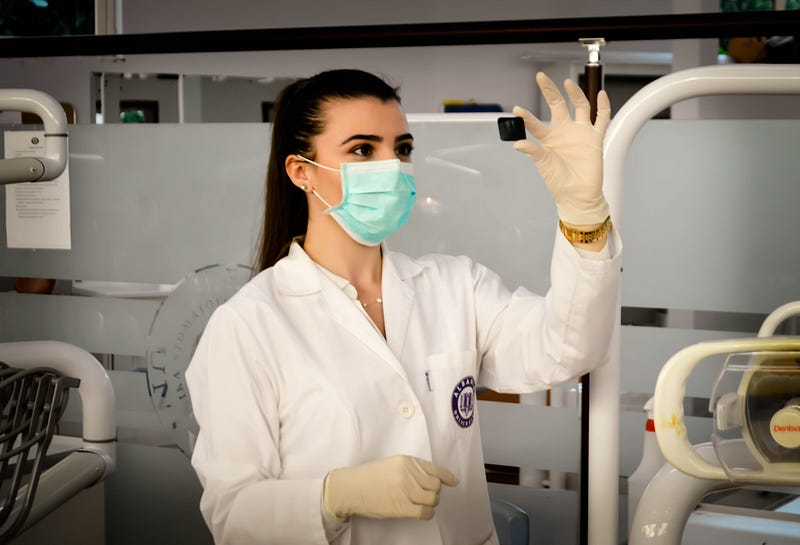The Implications of DNA Testing: Are We Overstepping Boundaries?
Written on

It was Christmas Eve at 4pm, and I found myself anxiously sitting in a hospital waiting area, contemplating whether I would catch the last train home for the holidays. The festive decorations around the room, including a little shiny Christmas tree behind the receptionist, only heightened the underlying tension present in the neurology department.
Eventually, my name was called, and I expressed my gratitude to the consultant who was working during the holiday season. He brought up my latest MRI scans, displaying my brain in its stark black and grey appearance.
“The lesion remains unchanged from four, seven, and ten months ago,” he informed me. “Honestly, we believe you’re a V.O.M.I.T.” He chuckled, clearly amused. I appreciated his demeanor; all the neurologists I've encountered have been respectful and somewhat light-hearted.
“A V.O.M.I.T?” I asked, intrigued.
“A Victim of Modern Imaging Technology,” he clarified, still smiling.
This situation reminded me of the saying that ignorance is bliss—a notion that, although not typically applicable in medicine, seems relevant here. This brain lesion has puzzled neurologists for over a year now. It was found while searching for something else, and their responses have oscillated from “we don’t truly know what it is” to “it doesn’t seem to be causing any issues.”
This brings me a sense of relief.
The Age of Over-Analysis
In the past, people would visit the doctor primarily when they felt unwell or noticed a significant change in their health. Those days are gone.
Today, we are obsessed with tracking our health metrics. How many steps did you take? How much water have you consumed? How well did you sleep? What’s your stair count?
What began as a light-hearted attempt to motivate physical activity has morphed into a full-blown obsession with metrics. It’s less about achieving 10,000 steps and more about ordering a DNA test to discover genetic markers for potential illnesses. Numerous companies now claim to reveal everything from your Viking ancestry to your likelihood of developing various diseases.
In the UK, routine health checks have traditionally been reserved for infants and the elderly. The prevailing wisdom has been that if you feel fine, you likely are.
However, feeling fine is no longer sufficient. Maintaining a balanced diet, exercising, and getting adequate sleep are not enough. We crave more—information about our future health, a roadmap to guide our lifestyle choices, and a means to confront our genetic inheritance.

Is Too Much Knowledge Detrimental?
Proponents of genetic testing argue it can be life-saving by identifying genetic predispositions to certain diseases. In a Guardian article, the co-founder of 23andMe noted how her husband learned of his increased risk for Parkinson's, prompting healthier lifestyle choices.
But what does this imply? Would he have remained inactive and reliant on caffeine if he hadn’t discovered his risk? While joining a research group may contribute positively to science, what if a person learns they are predisposed to multiple conditions? It could become overwhelming.
DNA testing can indeed advance medical research, but what benefits does it bring to individuals? The NHS is already burdened by the “worried well.” I can only imagine my GP's reaction if I presented a report indicating a mere 2% increased risk for a condition.
I suffer from an eye condition that has severely impaired my vision in one eye. During my last appointment, my consultant emphasized the importance of maintaining my cardiovascular health for life. My immediate thought was, “Isn’t that common sense?”
I don’t require an eye condition to remind me to care for my heart and blood pressure—those are basic health responsibilities.
I worry that if we begin using illness as a motivator for healthy living, we risk missing the point of our extraordinary bodies. It should not merely be about avoiding disease but about fostering overall wellness. Though they may seem similar, this reflects a fundamental shift in mindset.
If I received a DNA report indicating a low risk for hypertension, I wouldn’t think, “Fantastic! Time for fast food daily!” That would be akin to saying, “I’m healthy? Bring on the challenges!”
If we adopt genetic predisposition as a motivator, we may also use the lack thereof as a demotivator. This does not even consider the stress that comes with such knowledge.
Once Noticed, It’s Hard to Ignore
For the first 29 years of my life, I was unaware of my brain lesion.
After discovering this “pretty large abnormality” in a sensitive area of my brain, I initially felt a sense of panic.
While both my neurologists and I agree that brain anomalies warrant caution, my consultant pointed out that without advanced imaging technology, I might never have known and would have avoided unnecessary anxiety.
I consider myself fortunate—not only because my brain is unusual yet healthy, but also because the conclusion drawn after extensive observation was that it may have been present all along.
However, if I took a DNA test and received alarming predisposition results, it would feel like living with ticking time bombs. Such knowledge could be torturous.
I’m not advocating for ignorance, but I question whether we need to draw a line somewhere. The more information we possess that eludes our understanding, the more anxious we become.
Sensational headlines can exacerbate health anxieties. I’ve encountered outrageous claims suggesting that consuming carrots dramatically increases cancer risk. The misuse of medical statistics is widely recognized, yet it still induces stress—statistician Tim Harford addresses these issues adeptly in his BBC Radio 4 show, More or Less.
With a comprehensive DNA report, who will clarify its meaning for you? There’s an emerging field of genetic counselors, as many will likely require guidance to comprehend the implications of their results.

Where Should We Draw the Line?
This is undoubtedly a complex issue, one that may not have a straightforward answer.
I participated in a medical trial from ages 15 to 20, which ultimately revealed that I carried a high-risk strain of the virus they were developing a vaccine for. It’s important to note that the vaccine did not cause this; I received a placebo in the randomized trial.
This condition is typically not tested by NHS Trusts until one reaches 25 years of age. Without that incidental finding, I might not have lived to see 25.
What does this imply? Does it suggest that testing for uncommon conditions is advisable? In my particular case, yes. I underwent surgery and am now well, but it was a narrow escape.
However, does that justify indiscriminately testing for every conceivable disease? I don’t believe so. While I don’t wish to ignore potential health risks, I also don’t want to embark on a lifelong quest for nonexistent ailments.
I refuse to live in constant search of what might end my life.
Furthermore, what do these genetic predispositions signify in the real world? If we focus on genetic markers to extend our lives, shouldn’t we also consider lifestyle factors?
Statistically, one might be more likely to be injured crossing a street in a busy city than in a quiet rural area. Or perhaps people in high-traffic areas are more vigilant than those in less congested locations.
Living in a multi-story building may heighten the risk of falling compared to residing in a bungalow. Is there a lifestyle assessment available that indicates an increased risk of falling for those living on higher floors?
Assessing Risk
There are numerous actions we can take to enhance our chances of living longer without resorting to extensive DNA testing.
We can choose healthier foods and exercise regularly—no lab results are required for that. We can pursue holistic lifestyles that promote overall well-being. The human body functions on multiple levels; by caring for ourselves comprehensively rather than solely focusing on the red flags in a report, we might achieve greater health.
Of course, we should seek medical advice from professionals—never the internet—if we suspect something is amiss or if close relatives have hereditary conditions.
Personally, I won’t pursue a DNA test, even if curiosity tempts me. I might have genetic predispositions to various conditions, but considering that stress is a known killer and I’m already a V.O.M.I.T, I refuse to become a casualty of unnecessary medical scrutiny as well.